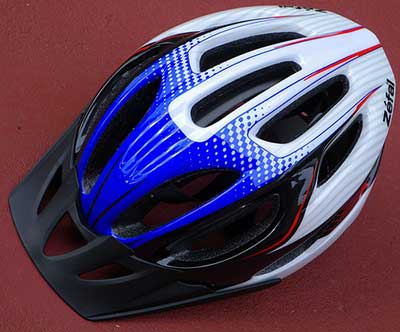 Last month the New York Times ran an editorial written by someone who found it refreshing that she could rent a bike for $2 in Paris and spend the day bicycling around the city with a baguette sticking out of the front basket and a beret atop her head in lieu of a bike helmet. She discussed that required helmet laws can actually hurt cycling because fewer people will be inclined to do it if they have to don a helmet. That successful bike share programs all over the world don’t pressure you to wear a helmet, and that bike accidents are rare in “mature urban cycling systems.” And that “Statistically, if we wear helmets for cycling, maybe we should wear helmets when we climb ladders or get into a bath, because there are lots more injuries during those activities.”
Last month the New York Times ran an editorial written by someone who found it refreshing that she could rent a bike for $2 in Paris and spend the day bicycling around the city with a baguette sticking out of the front basket and a beret atop her head in lieu of a bike helmet. She discussed that required helmet laws can actually hurt cycling because fewer people will be inclined to do it if they have to don a helmet. That successful bike share programs all over the world don’t pressure you to wear a helmet, and that bike accidents are rare in “mature urban cycling systems.” And that “Statistically, if we wear helmets for cycling, maybe we should wear helmets when we climb ladders or get into a bath, because there are lots more injuries during those activities.”
There are obvious pros and cons to riding a bicycle without a helmet. You probably feel less dorky hopping on a beach cruiser to casually pedal down the boardwalk if you don’t have to wear a helmet, and that hairdo you meticulously styled won’t get mussed up. Also, you’re only going a few miles an hour, you’re at less of a risk than a competitive cyclist bombing around a hairpin turn going 40 mph, right?
The risk may be lower, but there’s still a risk, even if you’re just leisurely cycling around your neighborhood. My friend’s mother took her bike out around the block a few times, and when she returned to her house she fell and hit her head. Unfortunately, she wasn’t wearing a helmet, nor did she go to the hospital. She ended up passing away overnight from the resulting head injury. My friend’s mother wasn’t being reckless or racing or weaving through cars. She just took her bike around her neighborhood and had a terrible accident that could have happened to anyone.
For separate bike trails and slow speeds, you can probably get away without wearing a helmet and being fine. But you could probably be fine driving without wearing your seatbelt, too. It’s that instance when you do get into an accident, whether it’s your fault or something completely beyond your control, where you’re thankful that you were wearing your helmet or your seatbelt. It’s a precautionary measure. You won’t need it every single time, but you’ll be glad you had it if the time comes where it will have done its job.
Our recommendation is that it’s better to be safe than sorry. Wearing a helmet requires almost no effort. They can be inexpensive and quite comfortable, and they do far more good than harm. If you’re a commuter cyclist and find yourself sharing the road with cars, pedestrians, and other cyclists in heavily trafficked areas, a helmet should be your best friend. If you’re just going for a leisurely ride with your buddies while you’re on vacation, see if you can borrow a helmet from the place that loaned out the bikes. If you find yourself in a situation where you have a bike but don’t have a helmet or can’t get ahold of one, make sure you stay alert and aware of your surroundings, and be as cautious and responsible as possible. Even in that instance, if you’re being careful and doing everything right, you can still get into an accident caused by someone else who was being reckless or wasn’t paying attention. Those are the instances you can’t fully prepare for, which is why helmets are always a good cautionary measure.
Photo credit: https://www.flickr.com/photos/dno1967b/5436491961/

